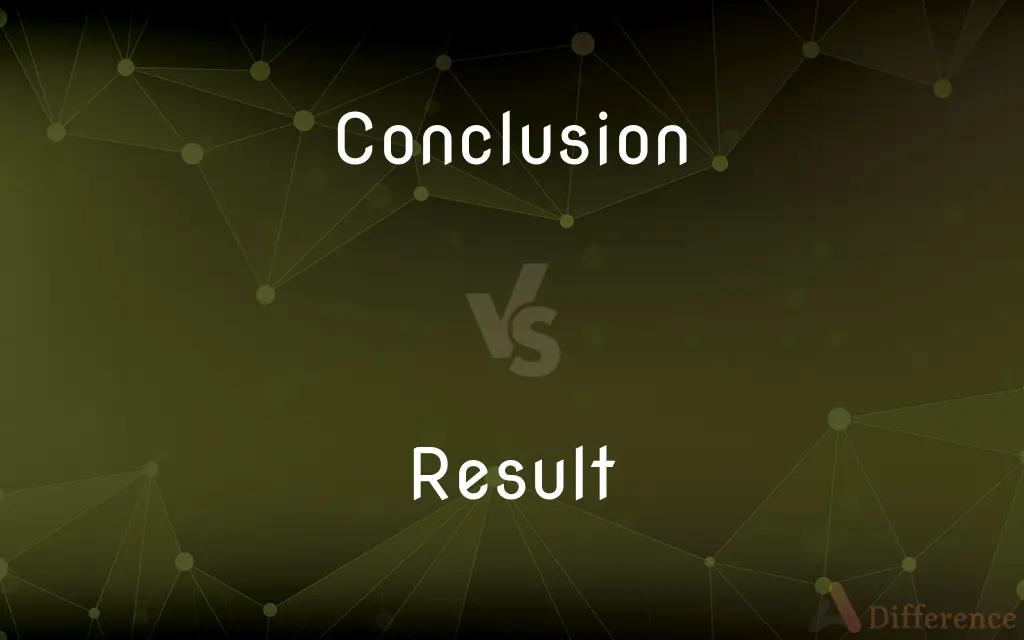Conclusion vs. Result — What's the Difference?
By Fiza Rafique & Urooj Arif — Updated on March 24, 2024
A conclusion is a judgment or decision reached through reasoning, while a result is the outcome of an action or process.

Difference Between Conclusion and Result
Table of Contents
ADVERTISEMENT
Key Differences
Conclusions and results are both endpoints, but they differ in how they are reached and their implications. A conclusion is derived from analyzing data or facts and involves interpretation, reasoning, and critical thinking. It is often seen in contexts like research, argumentation, and discussion, where a person assesses information to reach a reasoned judgment. Conversely, a result is more straightforward, being the direct outcome or effect of an action or experiment. It does not necessarily involve judgment but is a factual end product of a process, visible in experiments, actions, or events.
When conducting scientific research, the distinction becomes clear. The result is the data collected or observed from experiments, such as measurements or observations. These are objective and quantifiable. The conclusion, on the other hand, is the researcher's interpretation of the results, addressing the hypothesis and drawing inferences about what the results mean in the context of the study. This step requires critical thinking and analytical skills to connect the dots between the data and the overarching research questions.
In the realm of decision-making and problem-solving, conclusions are the end product of deliberation, where various options and outcomes are considered. A conclusion in this context represents a choice or judgment about the best course of action based on the information available. Results, however, are what follow the implementation of a decision. They are the tangible outcomes that can be observed and measured after actions have been taken, showing the effectiveness or consequences of the decision made.
Another perspective is in literary or academic writing. The conclusion of an essay or paper synthesizes the main points, reaffirms the thesis, and provides closure to the argument. It is an interpretive section that ties everything together and often suggests implications or future directions. The result in writing, particularly in research papers, refers to the findings from the study or investigation, which are presented in a neutral and objective manner without the author's bias.
The usage of these terms also highlights their difference in implication. Conclusions are often associated with finality in thought or theory, suggesting a level of subjective interpretation and synthesis of ideas. Results, by contrast, imply a finality in action or experiment, emphasizing the objective outcomes that arise from specific processes or actions.
ADVERTISEMENT
Comparison Chart
Definition
A judgment or decision reached through reasoning.
The outcome of an action or process.
Basis
Analysis, interpretation, and reasoning.
Direct outcomes, factual data.
Context
Research, argumentation, decision-making.
Experiments, actions, events.
Nature
Subjective, involves critical thinking.
Objective, quantifiable.
Implication
Finality in thought or theory.
Finality in action or experiment.
Compare with Definitions
Conclusion
The final part of something, summarizing the main points or results.
The conclusion of her speech emphasized unity and resilience.
Result
A consequence, effect, or outcome of something.
The result of the experiment supported the hypothesis.
Conclusion
A judgment or decision reached by reasoning.
His conclusion after reviewing the evidence was that the project was feasible.
Result
To occur or follow as the consequence of something.
Poor planning will result in project delays.
Conclusion
The outcome of a discussion or debate, especially one that leads to a decision.
The conclusion of the meeting was to proceed with the new policy.
Result
Information obtained from a test or experiment.
The results showed a significant increase in efficiency.
Conclusion
A proposition concluded or inferred from the premises of an argument.
The conclusion of his argument was that all citizens should vote.
Result
A final score, mark, or placement in a sporting event or examination.
The results of the final exam will be posted on Friday.
Conclusion
The end or finish of an event or process.
The conclusion of the trial brought relief to many.
Result
The outcome of a person's efforts or actions.
Her dedication to training had impressive results at the competition.
Conclusion
The close or last part; the end or finish
The conclusion of the festivities.
Result
A result (also called upshot) is the final consequence of a sequence of actions or events expressed qualitatively or quantitatively. Possible results include advantage, disadvantage, gain, injury, loss, value and victory.
Conclusion
The result or outcome of an act or process
What was the conclusion of all these efforts?.
Result
To happen as a consequence
Damage that resulted from the storm.
Charges that resulted from the investigation.
Conclusion
A judgment or decision reached after deliberation.
Result
To end in a particular way
Their profligate lifestyle resulted in bankruptcy.
Conclusion
A final arrangement or settlement, as of a treaty.
Result
Something that follows naturally from a particular action, operation, or course; a consequence or outcome.
Conclusion
(Law) The formal closing of a legal complaint or pleading.
Result
Results Favorable or desired outcomes
A new approach that got results.
Conclusion
A proposition that follows from the premises of a formal proof, for instance from the major and minor premises of a syllogism.
Result
(Mathematics) The quantity or expression obtained by calculation.
Conclusion
The proposition concluded from one or more premises; a deduction.
Result
To proceed, spring up or rise, as a consequence, from facts, arguments, premises, combination of circumstances, consultation, thought or endeavor.
Conclusion
The end, finish, close or last part of something.
Result
To have as a consequence; to lead to; to bring about
This measure will result in good or in evil.
Conclusion
The outcome or result of a process or act.
Result
(legal) To return to the proprietor (or heirs) after a reversion.
Conclusion
A decision reached after careful thought.
The board has come to the conclusion that the proposed takeover would not be in the interest of our shareholders.
Result
(obsolete) To leap back; to rebound.
Conclusion
(logic) In an argument or syllogism, the proposition that follows as a necessary consequence of the premises.
Result
That which results; the conclusion or end to which any course or condition of things leads, or which is obtained by any process or operation; consequence or effect.
The result of a course of action;
The result of a mathematical operation
Conclusion
(obsolete) An experiment, or something from which a conclusion may be drawn.
Result
The final product, beneficial or tangible effect(s) achieved by effort.
Conclusion
(law) The end or close of a pleading, for example, the formal ending of an indictment, "against the peace", etc.
Result
The decision or determination of a council or deliberative assembly; a resolve; a decree.
Conclusion
(law) An estoppel or bar by which a person is held to a particular position.
Result
(obsolete) A flying back; resilience.
Conclusion
The last part of anything; close; termination; end.
A fluorish of trumpets announced the conclusion of the contest.
Result
(sports) The final score in a game.
Conclusion
Final decision; determination; result.
And the conclusion is, she shall be thine.
Result
(by extension) A positive or favourable outcome for someone.
Conclusion
Any inference or result of reasoning.
Result
(UK) An exclamation of joy following a favorable outcome.
Conclusion
The inferred proposition of a syllogism; the necessary consequence of the conditions asserted in two related propositions called premises. See Syllogism.
He granted him both the major and minor, but denied him the conclusion.
Result
To leap back; to rebound.
The huge round stone, resulting with a bound.
Conclusion
Drawing of inferences.
Your wife Octavia, with her modest eyesAnd still conclusion.
Result
To come out, or have an issue; to terminate; to have consequences; - followed by in; as, this measure will result in good or in evil.
Conclusion
An experiment, or something from which a conclusion may be drawn.
We practice likewise all conclusions of grafting and inoculating.
Result
To proceed, spring, or rise, as a consequence, from facts, arguments, premises, combination of circumstances, consultation, thought, or endeavor.
Pleasure and peace do naturally result from a holy and good life.
Conclusion
The end or close of a pleading, e.g., the formal ending of an indictment, "against the peace," etc.
Like the famous ape,To try conclusions, in the basket creep.
Result
A flying back; resilience.
Sound is produced between the string and the air by the return or the result of the string.
Conclusion
A position or opinion or judgment reached after consideration;
A decision unfavorable to the opposition
His conclusion took the evidence into account
Satisfied with the panel's determination
Result
That which results; the conclusion or end to which any course or condition of things leads, or which is obtained by any process or operation; consequence or effect; as, the result of a course of action; the result of a mathematical operation.
If our proposals once again were heard,We should compel them to a quick result.
Conclusion
An intuitive assumption;
Jump to a conclusion
Result
The decision or determination of a council or deliberative assembly; a resolve; a decree.
Then of their session ended they bid cryWith trumpet's regal sound the great result.
Conclusion
The temporal end; the concluding time;
The stopping point of each round was signaled by a bell
The market was up at the finish
They were playing better at the close of the season
Result
A phenomenon that follows and is caused by some previous phenomenon;
The magnetic effect was greater when the rod was lengthwise
His decision had depressing consequences for business
He acted very wise after the event
Conclusion
The proposition arrived at by logical reasoning (such as the proposition that must follow from the major and minor premises of a syllogism)
Result
A statement that solves a problem or explains how to solve the problem;
They were trying to find a peaceful solution
The answers were in the back of the book
He computed the result to four decimal places
Conclusion
The act of ending something;
The termination of the agreement
Result
Something that results;
He listened for the results on the radio
Conclusion
A final settlement;
The conclusion of a business deal
The conclusion of the peace treaty
Result
The semantic role of the noun phrase whose referent exists only by virtue of the activity denoted by the verb in the clause
Conclusion
The last section of a communication;
In conclusion I want to say...
Result
Issue or terminate (in a specified way, state, etc.); end;
Result in tragedy
Conclusion
The act of making up your mind about something;
The burden of decision was his
He drew his conclusions quickly
Common Curiosities
How does a conclusion differ from a result in research?
In research, a conclusion interprets the results, drawing inferences and implications, while results are the objective data obtained from the study.
Why is it important to differentiate between conclusions and results?
Differentiating helps in understanding the role of interpretation versus objective outcomes in various processes, ensuring clarity in communication and analysis.
What is a conclusion?
A conclusion is a judgment or decision reached after analyzing and interpreting information.
Can a conclusion be considered a result?
While a conclusion can lead to results in terms of understanding or decision-making, it is not a result in the direct sense of being an outcome of an action.
How are conclusions formulated?
Conclusions are formulated through analysis, reasoning, and interpretation of data or information.
Is a conclusion always based on results?
Often, conclusions are based on results, but they can also be drawn from theoretical reasoning or deductive logic without empirical data.
What is a result?
A result is the direct outcome or effect of an action, process, or experiment.
Do all actions have both conclusions and results?
Many actions can lead to both, but results refer to the outcomes, while conclusions are specific judgments or interpretations made based on those outcomes.
How do results impact decision-making?
Results provide the factual basis that informs decision-making, indicating the effectiveness or consequences of actions taken.
Can results be subjective?
Results are generally objective and factual, derived from observations or experiments, without subjective interpretation.
What role do results play in scientific research?
Results provide the objective data that form the basis for conclusions, helping to support or refute hypotheses.
Are conclusions final?
Conclusions might be considered final for a specific context or time, but they can be revisited and revised with new information or understanding.
Can a conclusion change if new results are presented?
Yes, conclusions may change with new results, especially if the new data provide different insights or contradict previous findings.
Can there be multiple conclusions from the same set of results?
Yes, different individuals or groups may draw different conclusions from the same set of results, depending on their perspectives or analysis criteria.
How can results affect conclusions?
Results can significantly influence conclusions, as they provide the evidence that conclusions are based upon.
Share Your Discovery

Previous Comparison
Career vs. Major
Next Comparison
Anger vs. TemperAuthor Spotlight
Written by
Fiza RafiqueFiza Rafique is a skilled content writer at AskDifference.com, where she meticulously refines and enhances written pieces. Drawing from her vast editorial expertise, Fiza ensures clarity, accuracy, and precision in every article. Passionate about language, she continually seeks to elevate the quality of content for readers worldwide.
Co-written by
Urooj ArifUrooj is a skilled content writer at Ask Difference, known for her exceptional ability to simplify complex topics into engaging and informative content. With a passion for research and a flair for clear, concise writing, she consistently delivers articles that resonate with our diverse audience.
















































